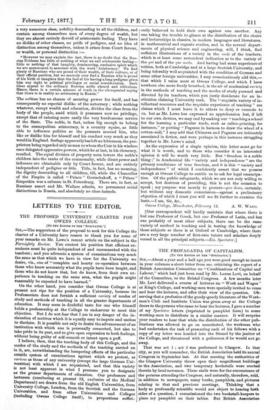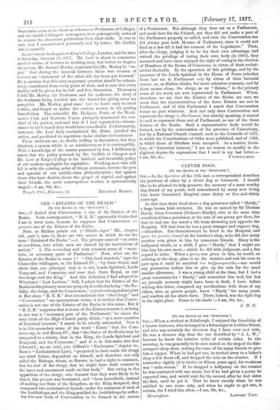THE PROPAGANDA OF CAPITALISM.
ms EDITOR OF THE “/SPBOTATOR:1 SIR,—About a year and a half ago you were good enough to insert in your columns a short letter from me, criticising the report of a British Association Committee on "Combinations of Capital and Labour," which had just been read by Mr. Leone Levi, on behalf of the Committee, to the Bristol Congress. A few months later Mr. Levi delivered a course of lectures on "Work and Wages" at King's College, and working-men were specially invited to come and hear the lectures, and offer their view of the question. Ob- serving that a profusion of the goody-goody literature of the Work- men's Club and Institute Union was given away at the College doors to the persons who came to hear the lectures, I gave a number of my Spectator letters (reprinted in pamphlet form) to some working-men to distribute in a similar manner. It will surprise your readers to hear that while the distribution of the other pub- lications was allowed to go on unmolested, the workman who had undertaken the task of presenting each of his fellows with a copy of my letter was hustled into the Strand by the janitor of the College, and threatened with a policeman if he would not go away.
That was act 1; act 2 was performed in Glasgow. In that city, as you will remember, the British Association held its annual Congress in September last. At that meeting the authorities of the Glasgow University threw open their magnificent buildings to the Association, and two temporary bookstalls were erected therein by local newsmen. These stalls were for the convenience of the persona attending the Congress, and naturally, therefore, sold, in addition to newspapers, many books, pamphlets, and pictures relating to that and previous meetings. Thinking that a body so profoundly scientific would not object to hearing both sides of a question, I commissioned the two bookstall-keepers to place my pamphlet on their tables. But British Association Secretaries seem to be about as tolerant as Professors of Colleges, and the terrified Glasgow newsagents were peremptorily ordered to remove the obnoxious publication from their stalls. It was in vain that I remonstrated personally and by letter ; Mr. Griffith was immovable.
In act 3 we are back again at King's College, London, and the time is Saturday, January 13, 1877. Mr. Levi is about to commence another course of lectures to working-men, but before he begins, his patron, Mr. Samuel Morley, expresses his (Mr. Morley's) " re- gret " that during the interval between these two courses of lectures no "statement of the other side has been put forward." He is anxious that this very important question should be exhaus- tively considered from every point of view, and is sure that every facility will be given for its full and free discussion. Thereupon I told Mr. Morley, his Professor, and his audience, the story of the workman being hustled into the Strand for giving away my pamphlet. Mr. Morley, good man ! had to leave early to catch a train, and forgot to notice the curious matter in his parting benediction. The estimable Mr. Hodgson Pratt, of the Work- men's Club and Institute Union, promptly denounced the con- duct of the janitor, and said that if I had reported the circum- stance to his Council they would have remedied it. Unfortunately, however, Mr. Levi flatly contradicted Mr. Pratt, justified the action, and predicted its repetition under similar circumstances.
These incidents are, no doubt, trifling in themselves, but they illustrate a system which is as mischievous as it is contemptible. With a knowledge of the matter possessed by few, I deliberately assert that the policy pursued by Mr. Griffith at Glasgow and Mr. Levi at King's College is the habitual and invariable policy of our modem apologists for capitalism. Working-men who will fall in with the existing order of things economic, become the pets and spaniels of our middle-class philanthropists ; but against those who have doubts about the gospel of capital, and against their friends, the most unscrupulous warfare is systematically waged.—I am, Sir, &c.,



































 Previous page
Previous page